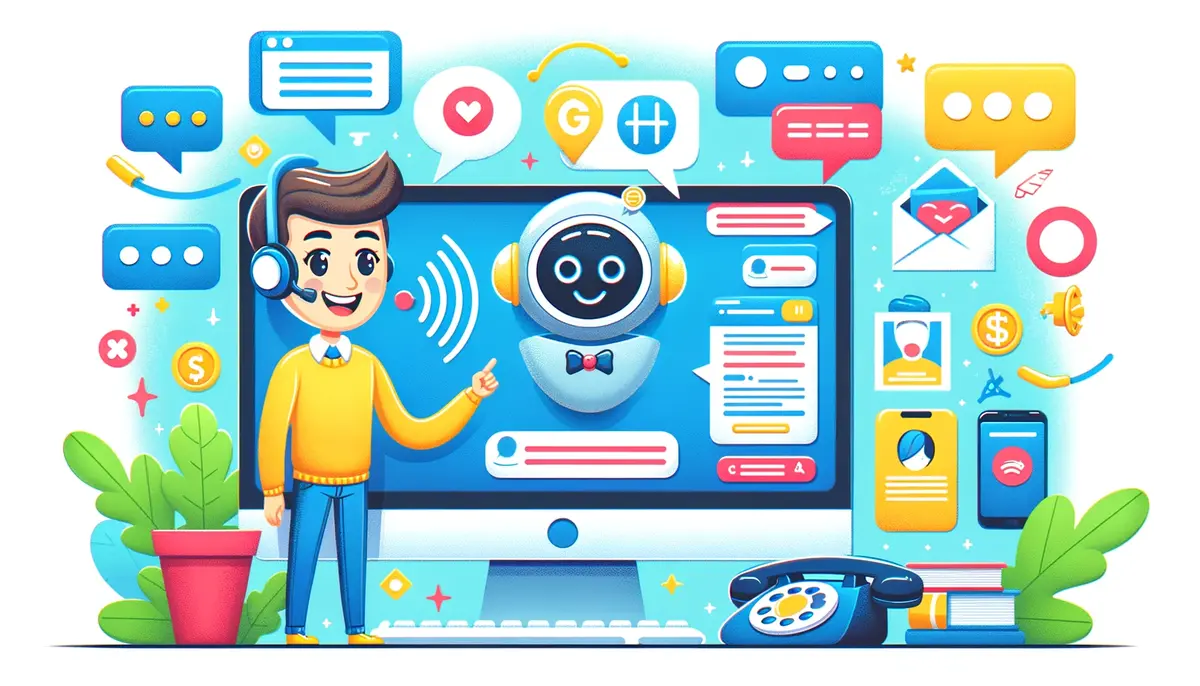AI is making waves around various industries. One of the most significant impacts is in customer service. With AI, companies can provide faster, smarter, and more personalized service. Let’s see how AI is revolutionizing customer services.
Care to save 90% of your call center costs?
Learn More Here
How AI is Changing Customer Services
AI plays a big role in customer service today. AI helps businesses interact with customers in a more efficient and effective way. It’s like having a super-powered assistant that never sleeps, always ready to help.
AI customer services use machines to mimic human intelligence. These machines learn from data, recognize patterns, and make decisions. They handle tasks that used to need human effort, such as answering customer inquiries, processing orders, and providing support.
Enhancing Customer Experience
Imagine calling a company and getting help immediately, no matter what time it is. That’s one of the biggest advantages of AI. It offers 24/7 customer service. No more waiting on hold or being frustrated by slow responses.
AI customer services can personalize interactions. They remember past interactions and use that information to provide better service. For example, if you frequently buy a particular product, AI might suggest accessories or complementary items based on your history. This makes customers feel valued and understood.
AI also ensures consistency in responses. Unlike humans, AI doesn’t get tired or make mistakes. This means customers get the same accurate information every time, enhancing their overall experience.
Efficiency and Cost-Effectiveness
Efficiency is a major benefit of AI in customer service. AI can handle repetitive tasks quickly and accurately. This frees up human employees to focus on more complex issues that require a personal touch.
For businesses, this means lower operational costs. AI doesn’t need a salary, benefits, or breaks. It can work around the clock, processing large volumes of customer requests without delays. This increased efficiency leads to faster resolution times, which in turn improves customer satisfaction.
Predictive Analytics for Proactive Service
One of the most exciting aspects of AI is its ability to predict customer needs. Using predictive analytics, AI can analyze data to foresee potential issues before they arise. This proactive approach helps in addressing problems early, preventing customer frustration.
For instance, if a customer has been experiencing frequent issues with a product, AI can alert the support team to reach out before the customer contacts them. This not only solves the problem faster but also shows the customer that the company cares about their experience.
Data-driven decision-making is another strength of AI. By analyzing customer interactions, AI provides insights into common pain points and preferences. Businesses can use this information to improve their products and services, making them more aligned with customer needs.
AI-Powered Self-Service
Self-service options are becoming increasingly popular among customers. AI-powered self-service tools, such as chatbots and virtual assistants, enable customers to find solutions on their own. These tools can answer questions, guide customers through processes, and even complete transactions.
Chatbots are one of the most common AI applications in customer service. They can handle a wide range of tasks, from answering simple inquiries to troubleshooting technical issues. Virtual assistants go a step further by providing more personalized assistance, such as recommending products based on past purchases.
These AI tools empower customers to solve their problems quickly and efficiently, without needing to wait for a human representative. This level of convenience enhances the overall customer experience.
AI in Multichannel Support
Customers today interact with businesses through multiple channels—phone, email, chat, social media, and more. AI helps businesses provide seamless support across all these channels. It ensures that no matter how a customer chooses to contact a company, they receive consistent and effective assistance.
AI systems integrate customer data from different channels into a unified profile. This means that if a customer starts a conversation on chat and then switches to email, the support team has all the necessary context to continue helping them without any confusion. This omnichannel approach, driven by AI, improves customer satisfaction and loyalty.
Sentiment Analysis and Customer Insights
AI can do more than just respond to customer queries. It can also understand how customers feel. Through sentiment analysis, AI evaluates the tone and emotion behind customer messages. This helps businesses gauge customer satisfaction and respond appropriately.
For example, if a customer sends a message expressing frustration, AI can flag it for immediate attention. This allows businesses to address negative experiences quickly, turning unhappy customers into satisfied ones.
Beyond sentiment analysis, AI provides valuable customer insights. By analyzing interactions, AI identifies trends and patterns. Businesses can use these insights to improve their services, tailor their marketing strategies, and create better customer experiences.
Continuous Learning and Improvement
One of the most powerful features of AI is its ability to learn and improve over time. AI systems continuously gather data from interactions and use it to refine their responses. This means that the more AI interacts with customers, the better it becomes at providing accurate and helpful support.
This continuous learning process ensures that AI systems stay up-to-date with changing customer needs and preferences. It also allows businesses to keep enhancing their customer service capabilities without significant additional investment.
Future trends in AI for customer service are exciting. As technology advances, AI will become even more sophisticated, offering new ways to delight customers and streamline operations.
Ethical Considerations and Challenges
While AI offers many benefits, it’s important to address ethical considerations. Privacy is a major concern. Businesses must ensure that customer data is handled securely and transparently. Customers need to trust that their information is safe and being used responsibly.
Another challenge is avoiding bias in AI algorithms. If AI systems are trained on biased data, they can perpetuate those biases in their responses. This can lead to unfair treatment of certain customer groups. Businesses must be vigilant in monitoring and correcting biases in their AI systems.
Transparency is key to gaining customer trust. Businesses should be clear about how they use AI and the benefits it offers. This includes being honest about the limitations of AI and ensuring customers can always access human support when needed.
Care to save 90% of your call center costs?
Learn More Here
Conclusion
AI is transforming customer service in remarkable ways. It enhances customer experience by providing personalized, consistent, and 24/7 support. It improves efficiency and reduces costs, allowing businesses to serve customers better and faster.
Through predictive analytics, AI can anticipate customer needs and address issues proactively. AI-powered self-service tools empower customers to find solutions independently, while multichannel support ensures seamless assistance across all platforms.
Sentiment analysis and customer insights help businesses understand and respond to customer emotions, improving satisfaction. Continuous learning ensures that AI systems keep getting better over time.
However, ethical considerations must not be overlooked. Ensuring privacy, avoiding bias, and maintaining transparency are crucial for building customer trust.
Businesses can revolutionize their customer service operations, delighting customers and staying ahead in a competitive market. The future of customer service is bright with AI, and the time to harness its potential is now.







